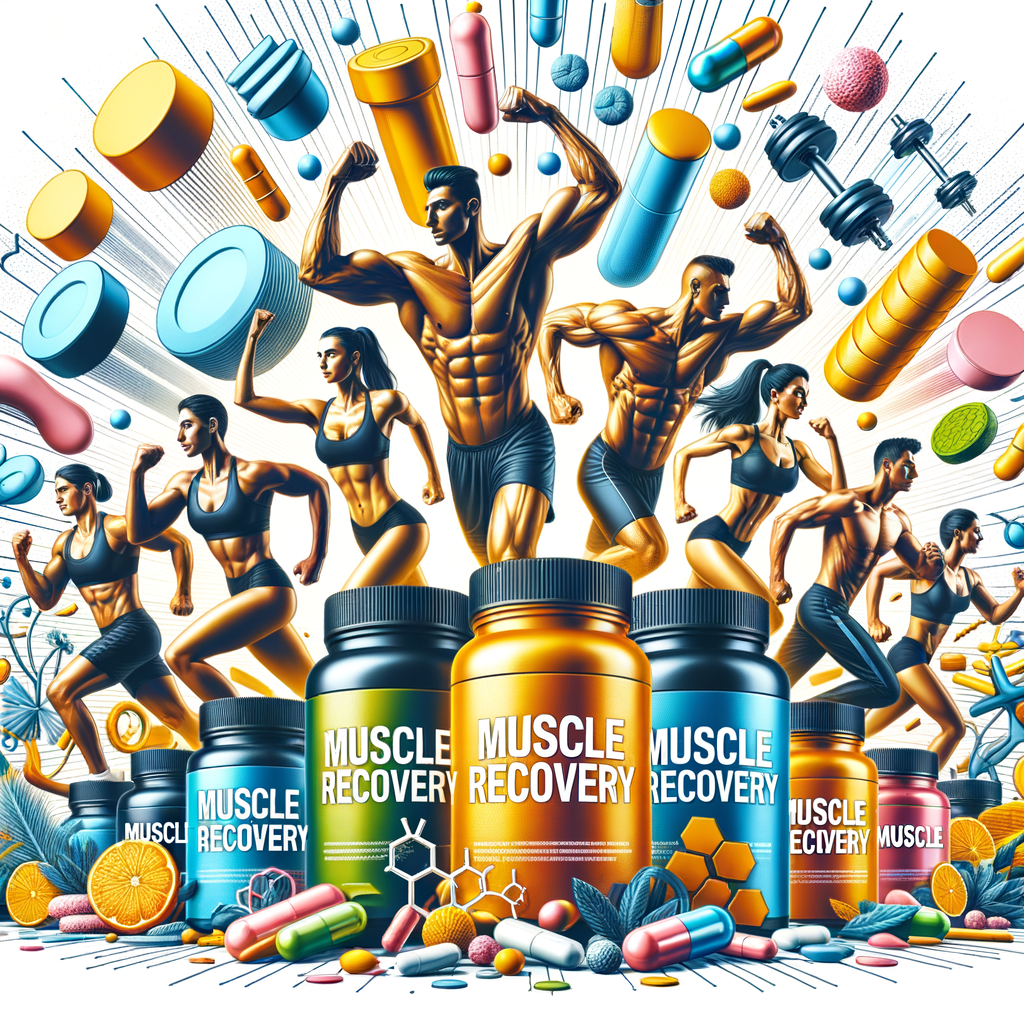- Understanding Muscle Recovery Supplements
- The Science Behind Muscle Recovery
- Why Recovery Supplements Are Necessary
- Popular Types of Muscle Recovery Supplements
- Protein Powders
- Branched-Chain Amino Acids (BCAAs)
- Creatine
- Electrolytes and Hydration Supplements
- Glutamine
- Omega-3 Fatty Acids
- Antioxidants
- Choosing the Right Supplements
- Dosage and Timing
- Potential Side Effects
- Popular Brands to Consider
- FAQs
- 1. Can I rely solely on muscle recovery supplements?
- 2. How long does it take to see results from supplements?
- 3. Are there any risks of overdosing on these supplements?
- 4. Do I need to take supplements if I eat a balanced diet?
- 5. Can I mix different types of supplements?
- 6. Is there a best time to take these supplements?
- 7. Are muscle recovery supplements suitable for everyone?
- 8. Can I take muscle recovery supplements if I’m not an athlete?
- 9. What should I look for when buying supplements?
- 10. Can muscle recovery supplements help with chronic soreness?
- Conclusion
Understanding Muscle Recovery Supplements
Muscle recovery supplements play a crucial role in optimizing your workouts. They help your body recover after intense physical activity. When you push your limits, your muscles go through wear and tear. To bounce back effectively, your body needs the right nutrients. This is where muscle recovery supplements come into play.
In a world filled with options, it’s essential to know which supplements provide the best results. You want to maximize efficiency without overwhelming your system with unnecessary ingredients. The right supplements not only speed up recovery but also enhance overall performance. Let’s explore some of the best options available for muscle recovery.
The Science Behind Muscle Recovery
Understanding how your body recovers provides insights into why supplements matter. After intense workouts, your muscles experience micro-tears. This can cause soreness and fatigue. Muscle recovery supplements aim to reduce soreness, speed up healing, and improve muscle growth.
Key nutrients in recovery supplements include proteins, amino acids, and electrolytes. Proteins rebuild muscle fibers. Amino acids, like branched-chain amino acids (BCAAs), improve muscle repair. Electrolytes replenish the minerals lost through sweat, helping maintain hydration and muscle function.
Why Recovery Supplements Are Necessary
Your body needs time to recover after workouts, but a busy schedule may not allow for that. Recovery supplements help bridge the gap. They provide essential nutrients in a concentrated form, ensuring you meet your body’s demands.
Moreover, these supplements can enhance muscle growth and improve overall athletic performance. When you recover faster, you can train harder and more frequently. This creates a positive cycle of improvement.
Popular Types of Muscle Recovery Supplements
The market offers a wide array of muscle recovery supplements. Each type serves a unique purpose and can benefit athletes differently. Here are some of the top options you should consider:
Protein Powders
Protein is the cornerstone of muscle recovery. It aids in muscle repair and growth. Protein powders are convenient and can be tailored to your dietary preferences.
– Whey Protein: This fast-digesting protein is ideal for post-workout recovery. It contains all essential amino acids and promotes quick muscle building.
– Casein Protein: This slow-digesting protein is best for nighttime recovery. It provides a steady release of amino acids, preventing muscle breakdown during sleep.
– Plant-Based Proteins: Options like pea, rice, and hemp protein cater to vegetarians and vegans. They may have a lower protein content but offer good nutritional profiles.
Branched-Chain Amino Acids (BCAAs)
BCAAs consist of three essential amino acids: leucine, isoleucine, and valine. They are a popular supplement for muscle recovery and growth.
– Benefits: BCAAs reduce muscle soreness, improve exercise performance, and stimulate protein synthesis.
– Usage: Many athletes take BCAAs before, during, or after workouts for the best results.
Creatine
Creatine is often misunderstood. While it’s mainly known for muscle gain, it also aids recovery. It enhances energy production during workouts, allowing you to push harder. This results in more significant muscle damage, which requires proper recovery.
– How It Works: Creatine increases phosphocreatine stores, helping replenish ATP (adenosine triphosphate), your muscle’s primary energy source.
– Performance: Enhanced energy leads to better performance, which means quicker recovery.
Electrolytes and Hydration Supplements
Staying hydrated is key for recovery. Electrolytes are minerals that help maintain fluid balance. When you sweat, you lose these crucial minerals. Replenishing them is vital for muscle recovery.
– Sodium, Potassium, and Magnesium: These are critical for muscle function. A deficiency can lead to cramps and fatigue, hindering recovery.
– Hydration Powders: Many brands offer hydration powders loaded with electrolytes. Mix them with water for an easy post-workout drink.
Glutamine
Glutamine is a non-essential amino acid but plays a significant role in recovery. It helps maintain muscle mass and reduces soreness after workouts.
– Immune Support: Intense exercise can deplete glutamine levels, potentially compromising your immune system. Supplementing can bolster your defenses.
– Usage: Many athletes take glutamine post-workout or before bed for recovery support.
Omega-3 Fatty Acids
Omega-3s aren’t just for heart health; they play a role in muscle recovery too. These essential fats have anti-inflammatory properties, which can reduce muscle soreness.
– Benefits: They help decrease exercise-induced muscle damage, allowing for faster recovery.
– Sources: You can find omega-3s in fatty fish like salmon, walnuts, and flaxseed. Alternatively, fish oil supplements provide a concentrated source.
Antioxidants
Exercise can produce harmful free radicals in your body. Antioxidants help combat oxidative stress, reducing muscle damage.
– Vitamin C and E: These vitamins are powerful antioxidants. They can help reduce muscle soreness and promote recovery.
– Polyphenols: Found in fruits and vegetables, polyphenols can also aid in reducing inflammation post-exercise.
Choosing the Right Supplements
The sheer volume of options can feel overwhelming. Selecting the right muscle recovery supplements involves considering several factors.
– Goals: Define what you want: quicker recovery, muscle gain, or endurance improvement? Your goal will guide your supplement choices.
– Diet: Your current diet plays a significant role. If you’re getting enough protein through food, you might not need a protein supplement.
– Lifestyle: Busy schedules can dictate supplement form. Powders are great for on-the-go, while capsules are easy to transport.
Dosage and Timing
Understanding when and how much to take can enhance your recovery journey. Generally, it’s crucial to follow the recommended dosage on your supplement bottle.
– Post-Workout: Aim to consume protein and BCAAs within 30 minutes after a workout for optimal recovery.
– Daily Intake: Ensure that your daily intake aligns with your overall dietary goals. Balance is key.
Potential Side Effects
While muscle recovery supplements can provide benefits, they are not without potential side effects. Here are a few to be aware of:
– Gastrointestinal Distress: Some individuals may experience bloating or stomach upset, especially with protein powders.
– Medication Interactions: Certain supplements can interact with medications. Always consult a healthcare professional if you’re unsure.
– Allergies: Ingredients in protein powders and other supplements can trigger allergic reactions in some. Always read labels carefully.
Popular Brands to Consider
Investing in quality supplements can make a significant difference. Here are some reputable brands to look into:
| Brand | Type of Products | Key Features |
|—————–|————————————-|——————————————-|
| Optimum Nutrition | Protein Powders, BCAAs | Wide variety, quality ingredients |
| BSN | Protein Powders, Amino Acids | Great taste, effective formulations |
| Cellucor | Pre-workouts, BCAAs, Protein | Innovative products, good reviews |
| Garden of Life | Plant-Based Proteins | Organic options, non-GMO |
| MusclePharm | Protein Powders, Creatine | Science-backed formulations |
FAQs
1. Can I rely solely on muscle recovery supplements?
Supplements should complement, not replace, a balanced diet. Whole foods provide essential nutrients that supplements may not fully replicate.
2. How long does it take to see results from supplements?
Results vary. Many see improvements within a few weeks, while others may take longer based on their activity level and diet.
3. Are there any risks of overdosing on these supplements?
Exceeding recommended dosages can lead to negative side effects. Always follow dosage instructions on the label.
4. Do I need to take supplements if I eat a balanced diet?
Eating a balanced diet may provide sufficient nutrients. However, supplements can help fill gaps in specific situations, such as intense training.
5. Can I mix different types of supplements?
Yes, combining different types can enhance recovery. For instance, taking protein with BCAAs can offer complementary benefits.
6. Is there a best time to take these supplements?
Post-workout is generally the best time to take protein and BCAAs. Creatine can be taken any time, but consistency is essential.
7. Are muscle recovery supplements suitable for everyone?
Most healthy adults can benefit, but it’s best to consult a physician before starting, especially if you have existing health conditions.
8. Can I take muscle recovery supplements if I’m not an athlete?
Yes, anyone who exercises can benefit from these supplements, as recovery is essential for all levels of activity.
9. What should I look for when buying supplements?
Choose reputable brands with transparent ingredient lists and ideally, third-party testing to ensure quality.
10. Can muscle recovery supplements help with chronic soreness?
These supplements may reduce soreness and promote healing, but chronic pain should be evaluated by a healthcare professional.
Conclusion
Muscle recovery supplements are a vital tool for anyone looking to enhance their fitness routine. By understanding the various options available, you can make informed decisions tailored to your specific needs. Remember, recovery is just as essential as training. Prioritize it, and your progress will reflect that commitment.
References:
– WebMD: Understanding Sports Supplements
– Healthline: Most Effective Muscle Recovery Supplements
– Bodybuilding.com: Top Supplements for Recovery
– Mayo Clinic: Supplements for Muscle Health



